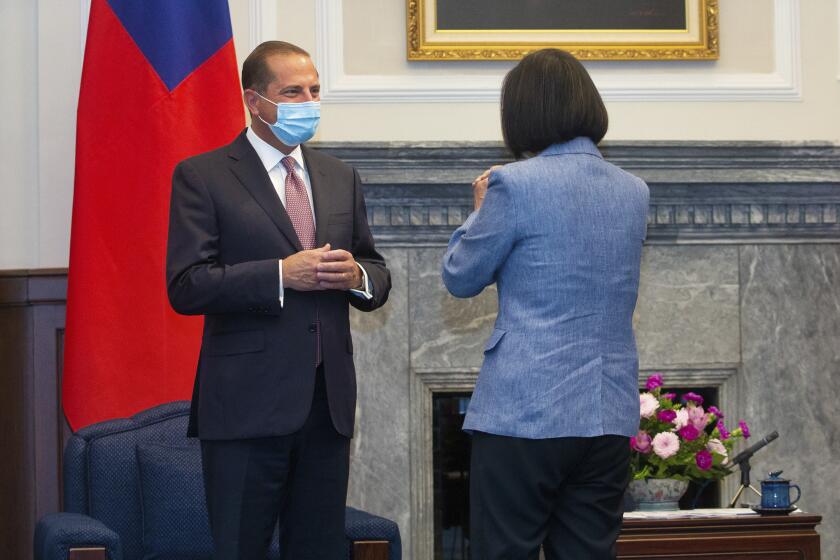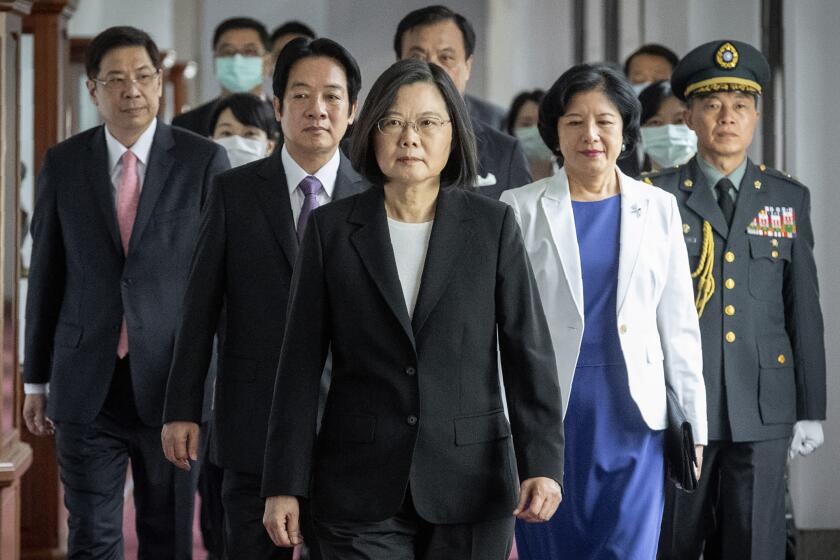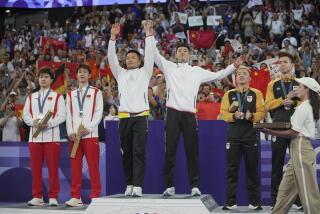- Share via
TAIPEI, Taiwan — If Taiwan is to fend off a Chinese invasion, it will need reluctant recruits like Roger Lin to summon the patriotism that inspired older generations but these days doesn’t burn as passionately in the young.
The 21-year-old French-language major regards his upcoming mandatory four-month military service as an unnecessary burden, even as complaints persist that such stints are too short to protect the island compared with the two to three years that previous generations served.
Weeks of flaring tensions between China and Taiwan, which has been buzzed by dozens of Chinese warplanes in a disquieting show of force, have not persuaded Lin to change his mind. If China and its much larger military decides to invade, the island’s devastation would be a fait accompli, he said, even with the outside chance the United States would come to Taiwan’s defense.
“The faster those four months pass, the better. It’s a waste of time,” Lin, swiping at his phone at a cafe on the campus of National Chengchi University in Taipei, said of his military service. “I don’t think the U.S. government will help us anyway. Whether they do or not, for us ordinary people, the outcome will be the same.”
Lin’s fatalism and indifference are somewhat expected among the young. But they come at a perilous moment. Fraught relations between Washington and Beijing are, more so than at any other volatile point, raising the possibility of war in Taiwan, a self-governed democratic island of 24 million that is roughly the size of Maryland. China has regarded Taiwan as a breakaway province since the end of the Chinese civil war in 1949.
The stakes for Washington are high. Losing a democratic Taiwan to China would probably signal the end of American power in the Pacific, freeing China’s military to project its strength in the region and beyond to the detriment of U.S. allies such as Japan and South Korea.
Led by an increasingly nationalistic Xi Jinping, China has in recent weeks flown military sorties deeper into Taiwanese airspace and beefed-up military exercises aimed at invading the disputed territory. The best hope for preventing a conflict that would probably draw in the U.S. is Taiwan’s willingness and ability to deter China’s aggression, experts said.
But the Taiwanese government has struggled to instill the same sense of urgency found in countries with national service requirements such as South Korea, Israel and even Singapore, which faces no immediate threats. A recent poll suggested the Taiwanese public was split on their willingness to repel an invasion even as the island remains overwhelmingly in favor of keeping free of China.
Taiwan’s active-duty military has shrunk to 165,000 from 275,000 three years ago. The Chinese People’s Liberation Army numbers 2 million.
Under public pressure to move to an all-volunteer army, Taiwan began phasing-out conscription in 2013. Better pay, housing and college scholarships offered by the armed services haven’t been enough to attract Taiwan’s youth, a shrinking population on a progressive island where negative attitudes toward the military have been shaped by its past under martial law.
“Taiwan doesn’t have that culture where you can go out in the street wearing your fatigues with pride,” said Huang Chung-ting, an assistant research fellow at the Institute for National Defense and Security Research in Taipei, the capital. “Soldiers leave as soon as they’ve completed national service. That’s a big problem. A lot of people think a good man doesn’t become a soldier.”
The visit by Health and Human Services Secretary Alex Azar to Taiwan comes amid tensions between Washington and Beijing, which claims Taiwan as its own.
Lin Chen-feng, a 30-year-old salesman at an education start-up in Taipei, said he discounted the prospect of a military career after his national service.
“My friends and I didn’t consider the army a good choice because we felt like we would lose ambition and not be able to fit into the real world,” he said. “It’s shameful now, but we laughed at people who signed a deal to continue.”
That’s enraged some of the territory’s veterans who accuse the young generation of blissful ignorance in a time of existential threat.
“The young only like to criticize China with their keyboards, but won’t join the army to show their determination,” said respected analyst James Huang, 47, a retired lieutenant colonel who served in the infantry. “After a missile attack or bombing by the PLA, do they think they can still use the internet?
“People in Taiwan today are not prepared for war,” he added.
Taiwanese President Tsai Ing-wen, who opposes unification with the mainland, has been working to promote military service. In August, she proposed raising Taiwan’s defense budget to record levels and supported reequipping the military with sea mines, drones and antiship missiles to stop an invading army. She is also trying to reform the island’s reserve forces to better act as an insurgency.
Tsai’s moves coincide with a debate within U.S. foreign policy circles over whether to revise America’s stance on defending Taiwan. The current policy, known as strategic ambiguity, leaves China and Taiwan guessing as to whether the American military will respond to an attack on the island. The approach is credited with maintaining the peaceful status quo since 1979, when Washington cut official ties with Taipei to launch diplomatic relations with communist China.
Now, leading voices — including the president of the Council on Foreign Relations, Richard N. Haass — are arguing that a more powerful and hawkish China must be countered with strategic clarity, an explicit warning of U.S. force if Beijing were to move against Taiwan.
“Such a policy would lower the chances of Chinese miscalculation, which is the likeliest catalyst for war in the Taiwan Strait,” Haass co-wrote last month in an article for Foreign Affairs.
Some experts fear that could undermine Taiwan’s efforts to rebuild its military: “I worry [it] would potentially confuse this work that Tsai is trying to do and allow people in Taiwan to say: ‘We don’t need to do this military spending. We don’t need to beef up our military because the U.S. is coming to our aid,’” said Shelley Rigger, a Taiwan expert and political scientist at Davidson College in North Carolina.
The chances of conflict appear to be increasing. China has stoked nationalism to deflect attention from its slower economy. It has clashed with Indian forces along its border, muscled its way across the South China Sea and brushed off international condemnation for dismantling Hong Kong’s autonomy — all while training its quickly modernizing military to invade Taiwan.
A pandemic, an economic downturn and an untested military have forced Beijing to temper calls for war. The move highlights the dangers of harnessing nationalism to bolster party control.
Washington has responded by strengthening ties with Taipei. The Trump administration dispatched high-level Cabinet secretaries to the island, approved another massive arms sale and built momentum toward a free trade agreement with Taiwan, which is usually excluded from such deals because of its diplomatic isolation. But pressure from Beijing is growing.
“China is trying to change the status quo,” said Yisuo Tzeng, director of the Division of Cyber Warfare and Information Security at the Institute for National Defense and Security Research. “Whether we can maintain the status quo, I’m not sure.”
It’s also unclear whether the U.S. could successfully defend Taiwan given American forces’ deficiencies in the region and Chinese weapons designed to thwart the U.S. Navy’s aircraft carriers.
“We do not have sufficient capability to come to Taiwan’s defense without putting our forces at great risk,” said Bonnie Glaser, director of the China Power Project at the Center for Strategic and International Studies. “In fact, [strategic clarity] may lead the Chinese to conclude that they should strike Taiwan while they still have an advantage to do so.”
Such scenarios have not changed the minds of many young Taiwanese about joining the military. Lai Yen-cheng, a 21-year-old international relations major at National Taiwan University in Taipei, admits that the Chinese military drills and flybys are starting to unnerve him. A career in the military is out of the question, though.
“Soldiers get more respect in places such as America, but we still don’t have that climate in Taiwan,” said Lai, who has yet to complete his four-month required service. “Military camp culture isn’t that strong, and our sense of patriotism isn’t as keen.”
His reluctance is partly due to the fact he and many other young Taiwanese don’t believe China would ever strike; they’ve spent their entire lives in peace. Only if the island were invaded would Lai volunteer to fight — with or without the U.S.
“If the United States takes more substantive action to help Taiwan, people would feel safer, but we can’t just rely on another country,” Lai said. “America is a sovereign nation and has its own considerations.”
Times staff writer Pierson reported from Singapore and special correspondent Jennings from Taipei.
More to Read
Sign up for Essential California
The most important California stories and recommendations in your inbox every morning.
You may occasionally receive promotional content from the Los Angeles Times.













